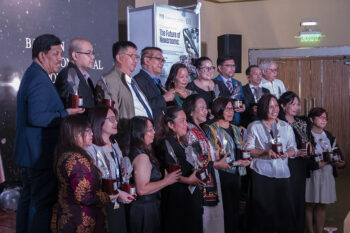DOHA, QATAR (MindaNews/06 September) – The report that the Philippine government may soon ban the deployment of house service workers (HSW), popularly known at home as domestic helpers (DH) here, the United Arab Emirates and Kuwait is big news in the Arabian Gulf.
A significant portion of the estimated two million Overseas Filipino Workers (OFW) in the Middle East region is in these three Gulf countries host. Qatar, a tiny country of 1.7 million, but awash with wealth already hosts some 200,000 Filipinos. About 26,000 of these are HSWs according to the Labor Attache of the Philippine Embassy here.
The influential English daily The Peninsula bannered Sunday “Manila may stop sending maids to Gulf.” The story also saw prominent treatment in other Gulf newspapers based in the UAE. Many Filipinos here fear that this development in Manila may unnecessarily result in unfavorable action from the Qatari government.
News like this may communicate an impression back home that finally Malacanang is moving to protect the welfare of the OFWs, especially those working in high risk environment like the HSWs. No problem about it for it addresses the need of about 34 percent of the country’s more than 10-million OFWs who are unskilled with hundreds of thousands of them toiling in Middle Eastern countries and neighboring Hong Kong, Singapore and Brunei.
The story on the deployment ban was based on a supposed policy recommendation from Labor and Employment Secretary Rosalinda Baldoz to the Department of Foreign Affairs. Baldoz reportedly urged a ban on the deployment of HSWs to the three countries allegedly due to their failure to comply with Republic Act 10022 otherwise known as the Amended Migrant and Filipino Overseas Workers Act of 1995.
How the supposed recommendation to ban deployment of Filipino HSWs in the Gulf leaked to the media should be investigated. While it is the duty of the government to protect their citizens at home and abroad, it would have been better that issues like this are addressed using the diplomatic track.
It simply is senseless braggadocio for the Manila government to suddenly wake up one morning and try to pick a fight with countries that serve as oases of its unemployed and underemployed citizens.
A labor deployment ban may be an option, but only if other options, particularly the diplomatic option has failed and if the Manila government has done its homework of creating decent jobs at home.
If the Philippines plays well its diplomatic relations with countries like Qatar for example, the country may gain much more aside from being at the receiving end of the billions of pesos in remittances from Filipino workers in the Gulf.
Among the Middle Eastern countries, Qatar, which has a moderate government, may have been the country’s important ally in international negotiations like those concerning climate change. Not dependent on oil but rich in the less carbon-intensive natural gas, being the world’s biggest natural gas producer now, Qatar shares the same position as the Philippines’ and the Group of 77’s in UN climate negotiations.
In fact, last year, Qatar had asked the Philippines to support its bid to host the 2014 Climate Change Summit or Conference of Parties 18 (COP 18).
In the peace front, Qatar, which had recently successfully brokered the final peace deal in Sudan, resulting in the birth of the new country South Sudan and one of the biggest supporters of the Libyan uprising, could play an important role in the problematic peace process in Muslim Mindanao.
A communiqué from the Office of the United Nations and Other International Organizations of the DFA in November 2010 had underscored the importance of Qatar in the country’s bid to gain observer status in the Organization of Islamic Conference (OIC).
The communiqué dated 12 November 2010 signed by DFA Undersecretary Erlinda Basilio indicated that “Qatar had consistently supported the Philippines’ OIC Observer bid, including at the 37thCouncil of Foreign Ministers Meeting held on May 18 – 20, 2010 in Dushanbe, Tajikistan.”
Qatar, which had just asserted the leadership role traditionally held by Saudi Arabia and Egypt, in the Middle East and North Africa in the Libya crisis and now in the bid of Palestine to have a seat in the United Nations, can sure have a significant say in the OIC regarding the Manila government’s bid for an observer status, a privilege held by the Moro National Liberation Front of Nur Misuari. The OIC no doubt is important in the ongoing peace process with the Moro Islamic Liberation Front (MILF).
So there is much more about the relationship between the Philippines and Gulf countries like Qatar than sending its unemployed citizens. And the Philippines better play these up rather than become cry baby one day and go amok another day over the welfare of its exported labor, and dilly-dally in its diplomatic efforts and jobs generation home.
As one Filipino based in Qatar said in a Facebook discussion on the issue, “okay lang naman maghamon ang Manila government kung may trabaho naman sa atin.”
Looking at figures at home however is sad. With real unemployment rate at more than 30%, and 10 percent of the country’s Gross Domestic Product dependent on the P18.76 billion OFW remittances last year, the outflow of desperate and destitute Filipino workers abroad will continue.
With the US struggling with its own unemployment figures and Europe and Japan also in money woes, Filipino workers would have to contend with the brown Middle East deserts as the new green pasture. (The writer is a Mindanaoan journalist who now works in Doha. Comments can be sent to bency.ellorin@gmail.com)







